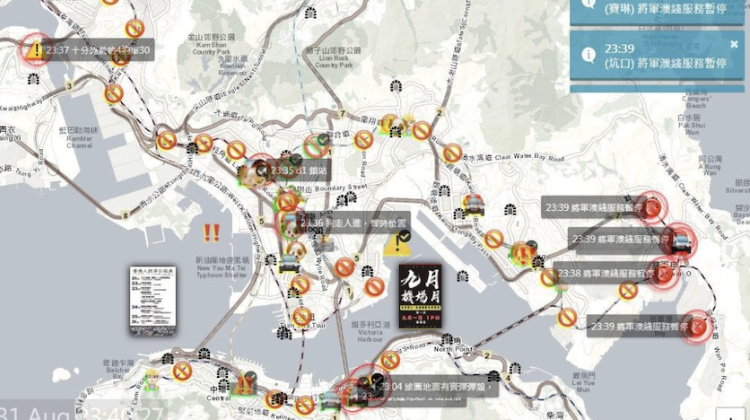The Insurgent Smart City

HKmap.live interface, which was used by protesters to track police movements around Hong Kong
The Hong Kong protests of 2019-2020 ultimately did not accomplish most of the demands of protesters, including calls for universal suffrage in the “special autonomous region” under China’s control since 1997. But they did see an outpouring of new protest formats and creative use of technologies to organize resistance against government surveillance efforts. In one moment of the protests, citizens actually targeted smart lampposts in a planned “smart city” of Hong Kong for their perceived role hosting cameras with surveillance and face recognition capabilities. In contrast to such state-sanctioned “smart city systems”, protesters deployed a range of “insurgent digital tactics” that paralleled systems seen in formal smart city. This included: encrypted messenger platform Telegram to form a variety of groups organizing social support, counter-surveillance of police, and crowdsourced custom-built mapping platforms to allow protesters to evade police.
In a new paper for the Journal of Urban Affairs, Andrew Stokols frames the 2019–2020 Hong Kong Anti-ELAB protests as an insurgent smart city, analyzing how grassroots deployment of technology achieved certain aims of smart city projects but through insurgent tactics instead of government or corporate smart cities.
"Even when they incorporate citizen engagement, smart city projects typically aim to solve specific problems like urban service delivery, sustainability, or innovation," said Stokols. "But the 'insurgent smart city,' analyzed in this paper, represented an assertion of citizen agency using digital tools that resembled certain aspects of smart city systems, albeit organized through grassroots mobilization."
Stokols is a doctoral candidate at DUSP whose research interests bridge political economy, history, urban design, and science and technology studies. He is particularly interested in how historical legacies of state-led industrialization shape current approaches to urbanization and development in the region. His dissertation work examines the ways in which countries and cities are trying to use data as a resource for development, representing a greater degree of local control over platform capitalism.
Read Stokols’ “The insurgent smart city: How a social movement created an alternative imaginary of the smart city


